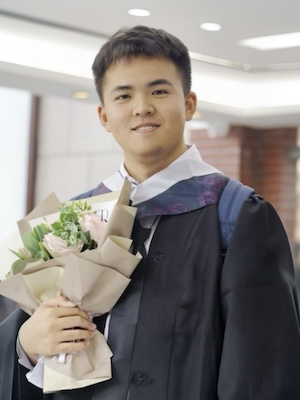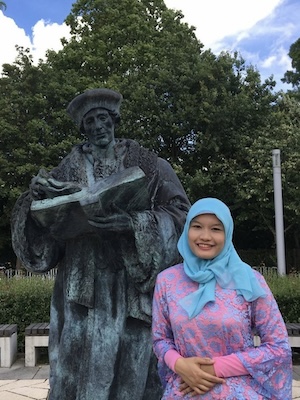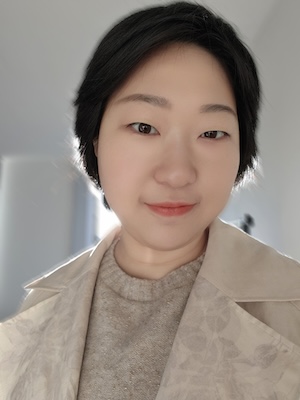Winner Travel Grant 2024
Yongjie Sun, Master’s student at East China Normal University, is this year’s winner of the EAPL travel grant for students and early career researchers from low to upper-middle income economy countries. The travel grant covers 80 % of the travel costs, up to a value of 650 €. Congratulations Yongjie!

Title of presentation: Comparing the performance of a Large Language Model (LLM; ChatGPT) and naive human interviewers in interviewing children about a witnessed mock-event
I am a first year master student at East China Normal University. My research focuses on utilizing large language models (LLMs) as an assistive tool in interviewing child eyewitnesses. Interviewing child eyewitnesses typically demands higher skills compared to interviewing adults, and direct training to enhance the capabilities of interviewers is not always effective. Therefore, my research explores the effectiveness of employing LLMs as an assistive tool in this context. The results indicate that LLMs show significant potential in child interviews; however, there are also numerous issues that need to be further addressed and resolved.
Winners Small Travel Grants 2024
Here are our winners of this year’s EAPL small travel grants. Each winner received 250 € to support them with their travel and accommodation costs. Congratulations to everyone!

Title of presentation: Enhancing the Eyewitness Recall: Cognitive Interview for Road Traffic Accident
In traffic accident investigations, obtaining comprehensive information from involved parties is crucial but can be influenced by various factors like time delays and leading questions by police. To overcome these issues, researchers have devised and tested empirical information-gathering techniques that could elicit reliable information, such as the Cognitive Interview/ CI (Fisher & Geiselman, 1992) and the Self-Administered Interview/ SAI© (Gabbert et al., 2009). However, their effectiveness in non-WEIRD (Western, Educated, Industrialized, Rich, and Democratic) countries remains understudied. The current research project aims to examine the appropriate techniques for information gathering during the occurrence of a traffic accident in Indonesia. In this conference, I will present the findings of my study, which examined the effectiveness of the CI in obtaining eyewitness testimony in the context of a traffic accident.

Title of presentation: Tipsy testimonies: The effect of alcohol intoxication status, crime role, and juror characteristics on mock juror decision-making
Erica Martin is a third-year PhD student in Forensic Psychology at the University of Sydney, supervised by Dr Lauren Monds and Dr Celine van Golde. Her research focuses on eyewitness memory, individual differences, and jury decision-making in cases involving alcohol intoxication. She will be presenting her latest study, which investigated the crime role of a testimony giver (victim or witness), their level of intoxication during the crime, and jurors’ personal characteristics on mock juror decision-making. This research demonstrated we can improve jurors’ understanding of the dose-specific effects of alcohol on memory by discussing intoxication using familiar lay terminology at trial.

Research on perceptions of intimate partner violence (IPV) has primarily focused on heterosexual relationships with male perpetrators and female victims. The oversight of same-sex couples, and relationships with female abusers and male victims, has led to inconsistent findings in the literature. This incoherence might be explained by a lack of theoretical understanding of people’s beliefs and assumptions about IPV. Thus, this study aims to assess the structure of IPV prototypes of different binary victim-perpetrator gender combinations. Using a mixed-methods approach, participants gave open-ended responses on what they believe are common assumptions and beliefs about IPV scenarios. To provide representations of the prototypes of the different IPV scenarios, psychometric network models of the responses were constructed, characterizing the correlations between the contents of participants’ responses. The findings show surprisingly strong global similarities between the prototypes, yet strikingly clear local differences in the domains of perpetrator, victim, relationship, and abuse.

Title of presentation: Is False Memory Implantation Blind? Exploring the Impact of Culture on False Memory Implantation for Repeated versus Single Events
Many studies on false memory creation use Western samples, focusing on false memories paradigms eliciting false memories for single events. Such work may not fully capture real-world scenarios, especially regarding repeated events like abuse allegations. This research examined the influence of event frequency and culture on false memory formation, focusing on Western and Eastern populations. The study uses the relatively new blind implantation method, where false memories are introduced without the participants’ knowledge, and examines the impact of event frequency on false memory formation. The research aims to understand how cultural factors affect susceptibility to false memories, particularly in cases involving repeated events. By including participants from Indonesia and Europe, the study seeks to broaden our understanding of memory processes across diverse cultural backgrounds. The findings have implications for forensic psychology, legal procedures, and memory-related practices, emphasizing the importance of considering cultural influences in memory research.

Current studies investigating stigma reducing interventions for non-offending pedophiles (NOP) often rely on explicit attitude measures to measure attitude change across participants, not accounting for implicit attitudes. To fill this gap in knowledge, my study utilizes an implicit association test (IAT) to measure implicit attitudes alongside explicit attitudes towards NOP, aiming to investigate the effectiveness of the humanizing narrative intervention in a United States sample. Additionally, the influence of gender, political standing, and history of child sexual abuse (CSA) on attitudes was examined. Surprisingly, implicit attitudes did not correlate with explicit attitudes in liberal participants, suggesting a discrepancy between self-reported attitudes and implicit biases. The unexpected misalignment between implicit and explicit attitudes among liberals implies that although liberals self-report to have less stigmatized views of NOP, they implicitly have a negative bias towards NOP that does not match up with their self-reported explicit attitudes.

Title of presentation: Unmasking Forgetting and False Memories: Insights from a Meta-Analysis
I am a first year PhD student at Maastricht University in the Netherlands. My current research focuses on forgetting and the formation of false memories in legal proceedings. Specifically, I investigate how forgetting may contribute to the creation of false memories, a topic highly relevant to the themes and topics addressed at the EAPL conference. When witnesses undergo interviews after long delays, details of their experiences may fade, raising questions about the validity of their testimony and the potential for the creation of false memories. The presentation I plan to deliver at the conference will provide a comprehensive understanding through a meta-analysis examining the relationship between forgetting and false memories, shedding light on this issue and its implications within the legal context, specifically to the practices of expert witnesses.
Title of presentation: With Great Power: Relationship Progression, Disclosure, and Power Dynamics in the Informant-Source Handler Relationship
In my PhD, I’m looking at the lifecycle of the informant-source handler relationship – what stages the relationship goes through, what processes are involved, and strategies to progress the relationship through the stages. I’m testing a model of relationship development (based on Knapp’s Staircase model) positing that relationships go through four stages of increasing disclosure and closeness. I’m expecting relationship progression to be driven by three processes: similarity, empathy, and trust. In my presentation at EAPL2024, I’ll be discussing the results of two studies testing this model, using a novel roleplay paradigm, where participants play the role of either the informant or the source handler, each with different goals. Ultimately, I’m hoping that this line of research will uncover relationship-building strategies for practitioners to use at various stages of their professional partnerships with informants.
Title of presentation: Interviewers, and Interpreters: Understanding the Key Factors that Benefit Culturally and Linguistically Diverse (CaLD) Sexual Assault Victim/Survivors in Investigative Interviews
My research project aims to is to identify critical factors that influence the cultural sensitivity of investigative interviews for sexual assault victim-survivors. For my EAPL 2024 presentation I will be discussing the preliminary results from the first study of this research project. In this study specifically, we investigated the role of interview language, and interpreter presence on culturally and linguistically diverse (CaLD) interviewees’ memory report quality and quantity, and their subjective interview experience. In the study, participants engage in an implied sexual assault scenario within a virtual reality environment. One week later, they participate in a cognitive interview where their memory report will be recorded. Participants’ emotional stress were measured pre and post scenario as well as pre and post interview. We anticipated the project output to reflect on the recent discussion of culture and memory and contribute to improving CaLD victim-survivor’s subjective experience with the criminal justice system.
